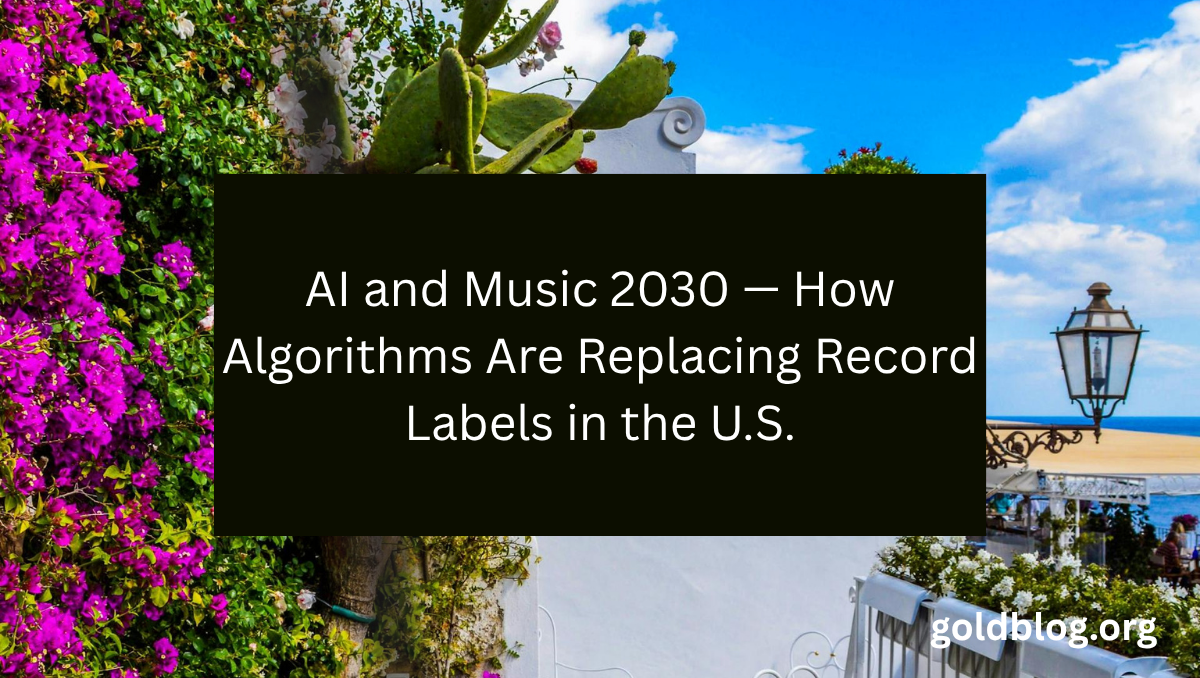Meta Title: AI and Music 2030 — How Artificial Intelligence Is Reshaping the U.S. Music Industry
Meta Description: By 2030, AI-generated music dominates charts and streaming. Discover how algorithms, data, and virtual artists are replacing record labels in America.
🚀 Introduction
In 2025, AI was just a tool for remixing beats and generating song ideas.
By 2030, it’s the producer, performer, and promoter — all in one.
Artificial intelligence now powers nearly 60% of the tracks streamed daily in the U.S. — from mood-based background playlists to chart-topping singles co-written by algorithms.
Major record labels aren’t extinct… but they’ve been completely transformed.
Music isn’t just made for the masses anymore — it’s made by the machines that understand them.
Let’s explore how AI has redefined the way Americans make, distribute, and connect with music in 2030.
🎛️ 1. The Algorithm Is the New Producer
In 2030, every major music platform — from Spotify and Apple Music to YouTube Sound and Amazon Beats — uses AI-powered production systems capable of generating songs on demand.
These systems analyze listener data from billions of streams, then build songs with:
- Predicted key progressions 🎹
- Emotionally optimized lyrics 🧠
- Tempo adjustments for mood and activity (e.g., driving, gym, studying)
Meet the producers of tomorrow:
- SONA™ (Spotify Original Neural Artist) — released 12 hit singles in 2029.
- MuseAI — co-produces tracks with human artists, mimicking their creative style.
- Juno Composer — an AI signed to Universal Music’s virtual label for cinematic soundtracks.
AI doesn’t just mix sound — it models emotion.
🎤 2. Virtual Artists Dominate U.S. Charts
By 2030, the Billboard Hot 100 looks very different.
Half of the chart is made up of AI-generated or hybrid performers.
🔹 Top AI Artists of 2030
- Eon Vega — Synth-pop AI artist who “collaborated” with The Weeknd on Digital Soul 3.0.
- MelodyX — Country AI with songs tailored to regional moods (Kansas, Texas, Alabama).
- LUCIA-9 — Virtual Latina performer co-created by fans via open-source lyric voting.
- EchoShade — AI grunge act blending Nirvana’s tone with Gen Z angst themes.
Their songs are personalized, adaptive, and constantly evolving — updated based on listener feedback in real time.
“You don’t just listen to music anymore — you train it to feel like you.”
— Rolling Stone Tech Edition, April 2030.
💰 3. Record Labels Become Tech Platforms
Traditional record labels like Universal, Sony, and Warner didn’t disappear — they morphed into AI data companies.
They now function as:
- Algorithmic Training Hubs: Licensing catalogs to train AI models.
- Brand Experience Managers: Pairing AI artists with corporate campaigns.
- Fan Data Analysts: Predicting what sound trends will dominate next quarter.
The “A&R” (Artist & Repertoire) departments of 2030 use predictive hit models, not scouting trips.
If an AI track hits a million listens in 24 hours, it gets “signed” to a label for marketing support — not creation.
🧠 4. AI Co-Creation — The Human Still Matters
Not all is machine-made.
Human artists still thrive — by working with AI rather than against it.
🔹 Examples:
- Billie Eilish’s 2030 concept album MirrorHeart used AI to reflect her emotional tone in real-time live performances.
- Post Malone released MAL0 v1.3, a hybrid project with half-human, half-AI vocals.
- Grimes’ “open-source voice licensing” model lets anyone use her voice legally through an AI API — earning her royalties automatically.
The 2030 rule of success: if you can’t outsmart the algorithm, collaborate with it.
🎧 5. Personalized Music = Infinite Playlists
Streaming services now generate hyper-personalized songs for every user — not just playlists, but full tracks.
AI creates:
- Mood-based daily soundtracks (“Rainy Commute,” “Morning Calm,” “AI Pump Mix”).
- Adaptive film scores that change with your heartbeat during workouts or gaming.
- Songs that evolve as you age — literally learning your emotional patterns over time.
Spotify’s “SoundGenome 2030” update even lets users train a personal artist AI, capable of creating new songs in your favorite style on demand.
Music has become fluid — unique to every listener.
💡 6. Copyright and Ethics: The Ongoing War
With AI composing millions of tracks daily, the legal system has scrambled to catch up.
Key U.S. Music Laws by 2030:
- AI Music Copyright Act (2027): Requires human input for any copyrightable track.
- Likeness Licensing Law (2028): Protects artists’ voices and styles from unauthorized AI mimicry.
- Royalty Redistribution Act (2029): Mandates that AI training datasets pay royalties to the original creators.
Still, piracy has evolved into “model theft” — where underground producers clone the sound signatures of top artists and release derivative music.
The question of “who owns creativity” has never been blurrier.
💬 7. How U.S. Audiences Feel About AI Music
According to a Pew Research 2030 study:
- 67% of Americans listen to AI-generated music weekly.
- 42% say they prefer AI tracks for background listening.
- 29% believe AI can “emotionally rival” human artists.
- 84% say authenticity still matters — but they define it differently.
In other words, fans don’t reject AI — they reject fakery.
As long as the song feels real, the source doesn’t matter.
🧩 8. The Future: Decentralized Music Ownership
By 2030, blockchain-based streaming platforms like Audius 3.0 and UtopiaSound allow fans to co-own music rights via digital tokens.
Listeners can invest directly in tracks or artists — human or AI — and earn royalties from streams.
Imagine earning income every time your AI co-created song gets played in a Starbucks.
That’s the new American music dream: listen, create, profit.
🧠 Conclusion
The U.S. music industry of 2030 is unrecognizable from a decade ago.
Record labels are algorithms. Artists are hybrids. And creativity flows from both mind and machine.
Yet amid all the change, one truth endures:
Music remains the most human art form — even when made by machines.
The future of sound isn’t artificial.
It’s amplified humanity.
AI doesn’t erase emotion — it engineers it.
